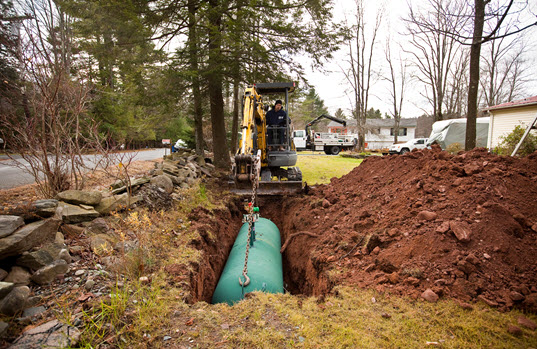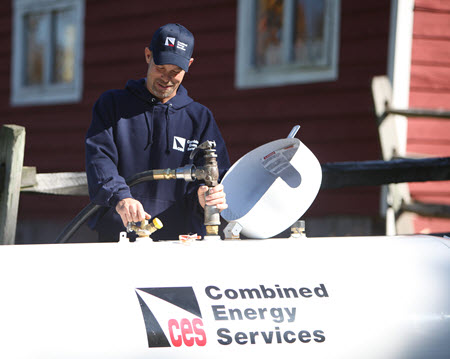The Propane Mindset
By Stephen Bennett
To venture into propane marketing with the mindset of a fuel oil marketer is a big mistake, advises Mike Taylor of Combined Energy Services, a company in Monticello, N.Y., that has marketed both fuels since the early 1970s.
“Oil gallons are slowly diminishing over time,” but fuel oil marketers should resist seeing propane as “the great pie in the sky,” Taylor said. “The whole thing is, it’s not the fuel oil business. It is entirely different. It has transportation, it has [fuel] and it has the same type of customer base, but it just has to be done in a totally different mindset.”
 Taylor’s father, Walter Taylor, got into the fuel oil business in 1968 by purchasing a one-truck operation. Over the next few years the senior Taylor purchased a propane cylinder delivery business, and then another small fuel oil company that also had a bulk propane truck, Mike Taylor said. A subsequent acquisition of Roy’s Gas, a company in Bethel, N.Y., marked the beginning of a move into propane on a bigger scale.
Taylor’s father, Walter Taylor, got into the fuel oil business in 1968 by purchasing a one-truck operation. Over the next few years the senior Taylor purchased a propane cylinder delivery business, and then another small fuel oil company that also had a bulk propane truck, Mike Taylor said. A subsequent acquisition of Roy’s Gas, a company in Bethel, N.Y., marked the beginning of a move into propane on a bigger scale.
Roy’s had been purchasing propane from a large northeast company, the younger Taylor said, “But my father soon realized that in order to really be in the business properly you had to have your own bulk storage facility.” Walter Taylor built one in the late 1970s–and a few more over the decades as the business grew. “We have four branch offices currently, seven propane storage facilities and two fuel oil facilities,” Mike Taylor said. The company operates in the Catskills and lower Hudson Valley in New York State, in the Poconos in eastern Pennsylvania “and we’re working on building our next location down in northern New Jersey now—another propane bulk plant and branch office,” Taylor said. (Walter Taylor, now 79, remains the president of Combined Energy Services.)
The company operates its own fleet of 15 propane trucks and five fuel oil trucks. “We haul all our own products,” Taylor said, “so we have five propane tractor-trailers, and we have two oil and gasoline trailers on the road.”
Once the business reached “a certain size,” Taylor said, “it made sense in our business model to have our own transportation. One of the main tips I would give anybody who’s looking at being in the propane business [is that] you have to be loyal to your supplier, and be loyal to whoever’s hauling your product for you. If there’s an opportunity to save two cents a gallon you have to pass it up. You have to find reliable suppliers.”
Taylor pointed out that in the propane business “you purchase gallons in the summer months and you allocate your gas in the winter. That’s very, very important. Propane supply can dry up very quickly.”
He warns against looking for “the cheapest rack price today.” Instead, he recommends establishing “a good relationship with good suppliers that are dependable.” Even then, Taylor said, “Nothing’s a hundred percent. Supply infrastructure for the Northeast especially is very thin. It’s improving drastically in the last few years with the advent of Marcellus shale gas. But there are problems.”
Propane for the Northeast is typically procured from what is known as the TEPPCO pipeline, operated by Enterprise Products Partners, a pipeline company headquartered in Houston, Texas. The pipeline has terminals in New York State in Watkins Glen, Oneonta and Selkirk. Propane supply is also procured from refineries in New Jersey and Philadelphia; from rail terminals, which receive propane from Texas, western Canada, and elsewhere; and from port terminals in New Hampshire and Providence, R.I.
Even so, Taylor said, “If something goes wrong, if we have a lot of demand, if the eastern United States is very cold, if a pipeline breaks, if there’s a Canadian rail strike, if there’s a blizzard which slows rail cars through upstate New York”— supply can become shaky, “so having a good relationship with a supplier is very important.” In fact, build good relationships with more than one supplier, he advised. Combined Energy Services purchases from three different suppliers.
“We also store a lot of gas in salt caverns [exhausted salt mines] in upstate New York for the winter as insurance to make sure we’re going to have the gas when we need it. We put away over a million gallons a year normally,” said Taylor.
Training and Safety
“All of our employees go through the NPGA Certified Employee Training Program,” Taylor said. “Most problems occur due to human error, and complacency is the root of all evil. Once we start becoming complacent an accident can happen.” He added, “The properties of propane are very, very predictable and I tell my people it’s always going to react the same way, but you have to respect it, you have to respect the product and once you lose that respect and become complacent, someone’s going to get injured.”
Selling tanks that are to be buried creates potential liability, Taylor warned. “You can’t just bury it and forget it.” The National Fire Protection Association’s Liquefied Petroleum Gas Code 58 requires cathodic protection testing every 24 months. “That is the testing of the magnesium anode bags,” Taylor said. “We have a full-time person that does nothing but go around and test the anode bags and they replace them as needed to make sure [the tanks] aren’t deteriorating in the ground. Metal is always trying to turn back into dirt. Mother Nature is trying to take that tank back to what it came from.”
Selling tanks for underground installation without telling the customer about the NFPA requirement for periodic testing creates “long-term time bombs in the field,” Taylor warned. “Once you’ve sold that tank to the consumer you’ve lost control over who’s going to be handling that testing. We never sell propane tanks. Selling tanks is really the kiss of death in so many respects.”
Price of Entry
Launching a propane business requires “a huge investment,” Taylor said. The investment includes equipment, tanks, safety training and insurance.
Based on what a number of industry veterans have told Fuel Oil News, here are some of the major costs: a delivery truck, approximately $125,000 to $150,000; a crane truck, with a price tag of about $100,000, to set tanks on customers’ property; and a service truck, such as a Ford F-450 or F-350 with a small utility body, for roughly $75,000.
For a bulk plant with a 30,000-gallon tank on land you already own: $250,000. That includes the cost of site work such as piping, concrete, fencing, electricity lighting and security. These investments together amount to approximately $600,000. Then there are the tanks that go on customers’ property. Tanks that hold 100 gallons typically cost about $400, experts told Fuel Oil News. Purchasing 100 at that price will cost $40,000. Larger tanks, which hold 1,000 gallons, cost about $2,000.
For more on getting into the propane business, visit the website fueloilnews.com, go to the digital archives and pull up the February 2012 issue. See the article titled “Propane: The Price of Entry,” pages 18-21.
Tips from Mike Taylor of Combined Energy Services
1: Propane isn’t fuel oil–margins aren’t a dirty word
- Never, ever, ever, sell tanks.
- Pony up and build your own bulk plant and be in control of your inventory
- Did I mention never ever sell tanks?
- Liability lasts forever with propane and very often if you touched something years ago–it’s tag you’re it, you’re in the [lawsuit].
- You can’t bury an underground propane tank and forget about it
- When oil leaks it creates a big expensive mess. When propane leaks you injure and kill people. Safety has to be in the forefront with everything you do every day
- Be loyal to your wholesale supplier and trucking company since when things get tight, you’ll need them.


Very good article!!!
Mike,
Great article, we have been dual fueled as well for 30 + years and I believe everything you say to be correct.
One problem we have here is that every oil company within the 100 miles of our operation is using propane as a saviour to their oil side. Another important issue is safety. I cannot stress that enough and with the “oil ” attitude people are going to get hurt or killed. I firmly believe it is easier to teach a propane gas service technician the oil side than vice versa because of the safety level. Keep in mind when one company makes a mistake it reflects badly on our industry as a whole and it takes time to rebuild the trust and confidence. I also agree that the schooling is so important for our industry, money well spent.
Good luck and lets hope for a good summer season.